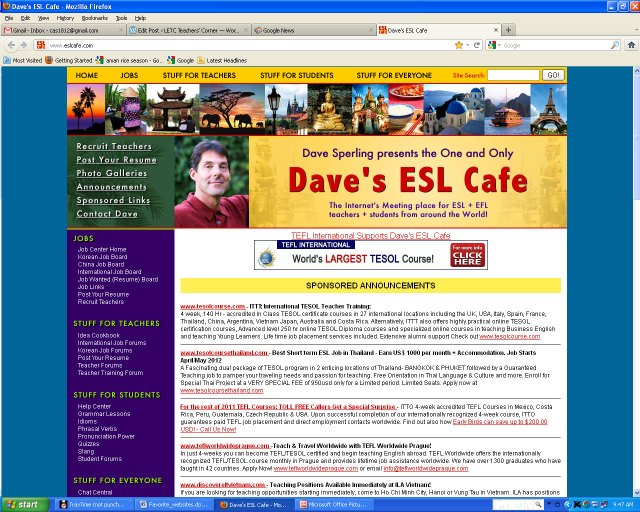Type “English as a second language” into Google and you get more than 10 million hits. “ESL” brings up 92 million. Even after you subtract websites for the Electronic Sports League and ElectroScience Laboratory and the like, it’s still an intimidating number. That may be why I seldom go to the Web when I’m looking for materials and ideas for my class. If it’s five o’clock and I’m teaching at seven, having 92 million possibilities at my fingertips is more annoying than helpful.
That’s too bad, because there is some good stuff on the Web. I asked Steve and Ashley to help me pick out a few sites that are especially interesting or useful. They contain material geared to students, or teachers, or both. Students can access the sites at home, or they can come to Language Lab outside class hours and use the computers there.
Ventures Arcade. This website accompanies the Ventures textbook series, and our classes use it in Language Lab. The site is clearly laid out and easy to use. A pop-up menu lets you select a level (Basic through 4) and unit (1 through 10). Each unit contains six interactive exercises geared to the lessons in the book. For instance, a student could choose “Level 1,” then “Unit 9,” then “Simple past with regular verbs” for practice with that skill. The exercises are the simple drag-and-drop, fill-in-the-blanks, click-the-icon type that we’re familiar with from Language Lab. This is the best website for reinforcing the Ventures material — obviously — but by the same token it doesn’t offer anything new or different. The site is free and carries no advertising.

Pronunciation practice on the ManyThings.org site. Students click to hear each word, then click again and choose the word they hear.
Manythings.org. This site is a fascinating hodgepodge. It offers quizzes, word games, word puzzles, proverbs, slang expressions, anagrams, pronunciation exercises, sing-alongs, and much more. It has an “Easy Things for Beginners” section that may be especially useful for our students. The “Minimal Pair Practice & Quiz” is excellent for pronunciation practice; we’ve used it successfully in Language Lab. Students can use this website on their own, but the site also has a wealth of ideas and activities that teachers can bring into the classroom. The site is free and has no advertising.
Dave’s ESL Cafe. Dave, whoever he may be, has an interesting if somewhat jumbled ESL site. The “idea cookbook” for teachers has categories such as games, holidays, and ice breakers; each category offers a menu with up to 50 activities, some of them contributed by ESL teachers around the world. As you might expect, some of these ideas are better than others. For students, there are lessons on grammar, idioms, slang, and the like, but as far as I can tell these are not interactive. The site is quite social, with teacher forums and student forums. It also has extensive ESL job resources, including for teaching English abroad. The site is free but it does carry some ESL-related advertising.
News English Lessons and Breaking News English. Sean Banville, who created these sites, must work nonstop on them because they really do keep up to date. Each site offers free mini-stories keyed to current headlines, ranging from the serious (“Israel, Palestine Prisoner Swap in Progress”) to the silly (“Justin Bieber Gives Advice on Makeup”). The two-paragraph story is followed by several pages of related exercises, all printable. News English Lessons uses simpler language than Breaking News English and is probably more appropriate for our students. These sites come with a few caveats. One, the author’s views on events are evident, and you may or may not agree with them. Two, some of the stories may be disturbing to our students or promote stereotypes about their countries, such as one titled “Child Sacrifice in Uganda Increasing.” Three, some of the writing is not that great. So use the site, but read the stories first and decide which ones are appropriate. This site carries ads for a variety of commercial products.

A simple crossword created on eduBakery.com. You can save and print a blank version of the puzzle with just the clues, and a solution version with the words filled in, and then make copies for students.
eduBakery.com. This site will generate word games — crossword puzzles, bingo cards, word searches, and word scrambles — using the vocabulary of your choice. You can feed in vocabulary from a Ventures lesson, for example, and print out simple games using those words. However, what you get for free is limited, and doing more requires purchasing an upgrade to “deluxe.” For example, the site will make you a free crossword with up to 10 words and clues; more than 10 requires upgrading.
LETC teachers, do you have sites that you have used and liked? Please share via a comment or e-mail, and we’ll include them in a future post.






Voice of America: Special English — http://www.voanews.com/learningenglish/home/
-uses a core vocabulary of about 1500 words
-uses short, simple sentences that contain only one idea
-the broadcast is read at a slower pace
…much more
Phonetics: The Sounds of American English — http://www.uiowa.edu/~acadtech/phonetics/
-best flash demonstration of the sounds of spoken (American) English that I can find. Definitely a worthwhile visit; however, it is not extremely user-friendly (at least not to people – like me – who are unfamiliar with the names and types of phonemes (?)).
REEP ESL Curriculum for Adults — http://www.apsva.us/cms/lib2/VA01000586/Centricity/Domain/74/reepcurriculum/index.html
-Very good, cohesive collection of materials. Good explanation of the curriculum that holds the various units together. See especially their materials about assessment and goal-setting – excellent.